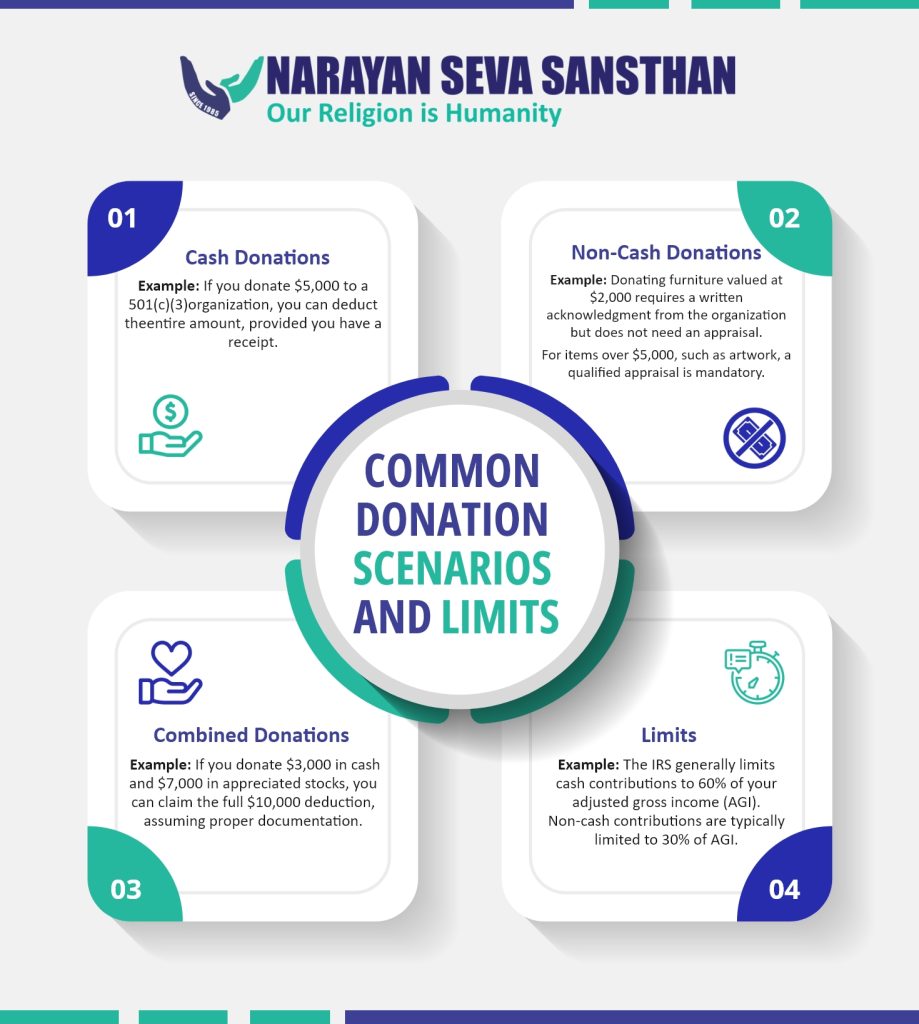As the 2024 tax season approaches, understanding how to maximize your tax deductions is essential for financial efficiency. By leveraging IRS guidelines and taking advantage of tax-deductible contributions, you can significantly reduce your taxable income while supporting meaningful causes. This guide focuses on 501(c)(3) donations in the USA and key strategies for making the most of your charitable contributions.
The Basics of Tax Benefits for Charitable Contributions
Contributions to charitable organizations can provide substantial tax benefits if done correctly. The IRS allows taxpayers to claim deductions for donations made to qualified 501(c)(3) organizations. Here’s what you need to know:
- Verify the Organization’s Status: Ensure the organization is a registered 501(c)(3) with the IRS. Contributions to non-qualified entities are not tax-deductible.
- Itemized Deductions: Taxpayers must itemize their deductions on Schedule A of Form 1040 to claim a deduction for charitable contributions.
- Cash vs. Non-Cash Donations: While cash donations are straightforward, non-cash contributions often require additional documentation and, in some cases, a qualified appraisal.
- Standard Deduction Consideration: If your total itemized deductions do not exceed the standard deduction ($13,850 for single filers and $27,700 for married filing jointly in 2024), you may not benefit from itemizing your donations.
Key IRS Forms and Guidelines
Proper documentation is crucial for claiming deductions. Here are the key forms you might need:
- Form 8283 (Non-Cash Charitable Contributions): Use this form to report non-cash donations exceeding $500. Ensure you include details such as the description of the property, fair market value, and the donation date.
- Form 8282 (Donee Information Return): If the receiving organization sells or disposes of the donated property within three years, they must file this form and notify you.
- Qualified Appraisal Requirements: For deductions exceeding $5,000 (or $500,000 for property), a qualified appraisal by a certified appraiser is mandatory. This ensures the valuation aligns with fair market standards and IRS regulations.
- Receipts for Contributions: Always keep written acknowledgment from the organization for contributions of $250 or more.
Maximizing Deductions Through Donations
Here’s how to ensure you’re fully leveraging your charitable contributions:
- Make Donations Before December 31, 2023: Contributions made by the end of the year are eligible for deductions in the 2024 tax season.
- Bundle Donations: If your total deductions do not exceed the standard deduction, consider bundling multiple years’ donations into one tax year to maximize the benefit.
- Document Everything: Always obtain a receipt or acknowledgment letter from the organization, especially for contributions of $250 or more.
- Donating Appreciated Assets: Donating stocks or other appreciated assets can help you avoid capital gains taxes while claiming a deduction for the fair market value.
- Payroll Deductions: Many employers offer payroll deduction programs for charitable giving. Retain the pay stub or W-2 reflecting the donation.
- Maximize AGI Limits: Understand the contribution limits based on your Adjusted Gross Income (AGI). Cash contributions are generally deductible up to 60% of AGI, while non-cash contributions may have lower limits.
IRS Resources to Simplify Tax Filing
The IRS offers a variety of tools to help taxpayers prepare their returns efficiently:
- Free File Program: If your income is below a certain threshold, you can file your federal tax return for free using the IRS Free File program.
- Volunteer Income Tax Assistance (VITA): This program offers free tax help to individuals with low-to-moderate incomes, persons with disabilities, and those with limited English proficiency.
- Tax Counseling for the Elderly (TCE): Aimed at taxpayers aged 60 and older, TCE provides assistance with retirement-related tax issues.
- MilTax for Military Members: Members of the U.S. Armed Forces and qualified veterans can access free tax services through the Department of Defense’s MilTax program.
- IRS Interactive Tax Assistant: Use this tool to find answers to specific tax-related questions, including the deductibility of charitable contributions.
Static Data: Common Donation Scenarios and Limits-
Here are some static scenarios to illustrate how deductions work:
Frequently Asked Questions (FAQs)
Q: What is a 501(c)(3) organization?
A: A 501(c)(3) organization is a nonprofit organization recognized by the IRS as tax-exempt. This means donations made to these organizations are deductible from your taxable income.
Q: How do I verify if an organization is a qualified 501(c)(3)?
A: You can easily check an organization’s status using the IRS’s Tax Exempt Organization Search tool available on IRS.gov.
Q: What documentation is required for non-cash donations?
A: The paperwork depends on the value of your donation:
- For non-cash donations over $500: You’ll need to file Form 8283 with your tax return.
- For items exceeding $5,000 in value: A qualified appraisal is required to document the fair market value of the donation.
Q: Are there deadlines for making donations to claim them on my 2024 taxes?
A: Yes, donations must be made by December 31, 2023, to be eligible for deduction on your 2024 tax return.
Q: Can I deduct donations made to international charities?
A: Generally, only donations to U.S.-based 501(c)(3) organizations qualify for tax deductions. However, some exceptions exist for specific international organizations meeting IRS criteria.
Q: How do I calculate the fair market value of donated items?
A: The fair market value represents the price a willing buyer would pay for the item in an open market sale. For significant donations, a qualified appraisal is recommended.
Q: What happens if I don’t attach the required appraisal?
A: If a qualified appraisal is mandatory and not included, you may lose the deduction for your donation unless you can demonstrate reasonable cause for its absence.
Q: Can I claim deductions for volunteer services?
A: While the value of your volunteered time isn’t deductible, you can deduct out-of-pocket expenses directly related to your volunteer work, such as travel mileage or supplies used.
Conclusion
Maximizing tax deductions before the 2024 tax season requires careful planning and adherence to IRS guidelines. Contributions to 501(c)(3) organizations in the USA not only support valuable causes but also offer substantial tax benefits. By leveraging tools like IRS Free File, utilizing programs such as VITA and TCE, and ensuring proper documentation, you can streamline the process and optimize your tax savings.








